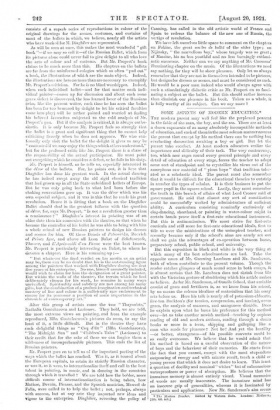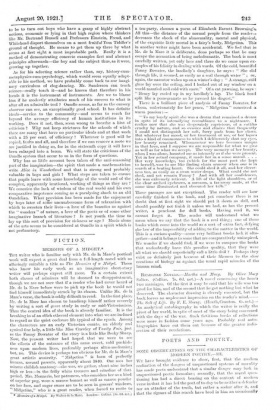SOME ASPECTS OF MODERN EDUCATION.* THE modern parent may well
feel like the perplexed peasant in the fable of the man, the boy, and the ass. There are at least a dozen exponents of as many absolutely incompatible methods of education, and each of them in the most solemn manner assures the parent that except by his method there can be nothing but everlasting damnation awaiting a boy or girl. But let the parent take comfort. At least modern educators realize the importance and difficulty of their task. The very controversy, too, which now rages round every general principle and every detail of education at every stage, forces the teacher to adopt some sort of standpoint and to crystallize his views out of the amorphous raw material of " pious hope " that tradition toler- ated as a scholastic ideal. The parent must also remember that it would be difficult for the educational theories to outstrip in number the types of scholar. It is their business to put the square pupil in the square school. Lastly, they must remember the truth in this branch of affairs of what Lord Cromer said ol government. He said that almost any sort of constitution could be successfully worked by administrators of sufficient ability. A curriculum consisting nominally exclusively of clog-dancing, shorthand, or painting in water-colour might in certain hands prove itself a first-rate educational instrument. But this is antinomianism. We must strive for first-rate curricula and still more for first-rate educational ideals, first to tide us over the ministrations of the uninspired teacher, and secondly because only if the school's aims are sanely set out shall we gain the advantages of co-operation between home, preparatory school, public school, and university.
But this exposition in black and white is the very thing at which many of the best schoolmasters are bad. Take the opposite cases of Mr. Greening Lamborn and Mr. Sanderson, both of whom contribute to the present volume. Though the reader catches glimpses of much sound sense in both essays, it is almost certain that Mr. Lamborn does not shrink from life with the Victorian gesture of shuddering which his article makes us believe. As for Mr. Sanderson, of Oundle School, that amiable casuist of gases and fertilizers is, as we know from his school, by no means the solemn idealizer of materialism that his essay sets before us. Here his talk is nearly all of potassium-chlorate, five-ton Buckton's (for tension, compression, and torsion),worm gears, the analysis of manures, and manganese dioxide. Does he explain upon what he bases his preference for this method over—let us take another newish method—teaching by copious reading of old and modern authors, reading through a dozen books or more in a term, skipping and galloping like a man who reads for pleasure ? Not he ! And yet the hostility —or better, strangeness—of his possible converts could be so easily overcome. We believe that he would admit that his method is based on a careful observation of the nature of boys and the behaviour of their memories. He starts from the fact that you cannot, except with the most stupendous outpouring of energy and with minute result, teach a child or young person that which it does not desire to learn. This is not a question of docility and nominal "wishes" but of subconscious waterproofness or power of absorption. He believes that the immature memory is almost entirely visual. Visual memories of words are usually inaccurate. The immature mind has an insecure grip of generalities, whereas it is fascinated by particulars and applications. Now Mr. Sanderson's aim seems
• Ths Modern Teacher. Edited by Watson Bain. London : Methuen. [l0s. ad. net.]
to be to turn out boys who have a grasp of highly abstract notions, economic or lying in that high region where thinkers like Mr. Bertrand Russell and Professors Einstein, Freud, and Whitehead disport themselves on a most fruitful Tom Tiddler's ground of thought. He means to get them up there by what seems at first sight a most improbable path. Really it is a method of demonstrating concrete examples first and abstract principles afterwards—the boy and the subject thus, as it were, growing up together.
As for his selecting science rather than, say, history-cum- metaphysics-cum-psychology, which would seem equally adapt- able to his method, we have probably come back to our imagi- nary curriculum of clog-dancing. Mr. Sanderson can teach science—really teach it—and he knows that therefore in his hands it is the instrument of instruments. Are we to blame him if he modestly attributes much of his success to what is after all an admirable tool ? Oundle seems, as far as the cursory observer can see, an exceptionally good school. It has definite ideals—service to the community—and seems to reach far beyond the average efficiency of human institutions in its working. Does it not, then, seem wrong to breathe a hint of criticism ? Why not keep strictures for the schools of which there are many that have no particular ideals and at that work with a 25 per cent. of efficiency ? Whatever is good will be copied, faults and all, and therefore if we can remove a mote we are justified in doing so, for in the sixteenth copy it will have been enlarged into a beam. We will state the criticisms of the Oundle system that occur to us in the form of questions.
Why has so little account been taken of the anti-reasoning part of the imagination—the spirit that made a mathematician write Alice in Wonderland and that is strong and probably valuable in boys and girls ? What steps are taken to ensure that pupils leave with some knowledge of the world and of the complex, apparently irrational, working of things as they are ? We conceive the lack of wisdom of the real world and his own comparative impotence coming as a paralysing shock to an old Oundelian. What viilovision has been made for the enjoyment by boys later of some uncumbersome form of relaxation with which to sweeten their lives—a love of the beauties as against the " wonders " of nature, a love of the poets or of some other imaginative branch of literature ? Is not youth the time to lay up this sort of provision for sickness or age ? Music alone of the arts seems to be considered at Oundle in a spirit which is not perfunctory.



































 Previous page
Previous page